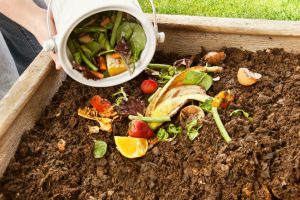Here at a small, liberal arts university you wouldn’t think that food waste would be much of a problem. However, in an era of convenience and material goods, most people on campus take the accessibility of food for granted. We don’t need to worry about where our food is coming from, whether it will be available, how many resources went into cooking it, or where our scraps go after we finish our meal. The concept of the clean plate club flew out the window as soon as we left Mom’s domain.
As part of Furman’s sustainability initiative, we compost all the food waste created by the dining hall and from several other places on campus. On average we process more than 32 tons of food waste per year, most of which is composted. However, we only seem to use a minuscule portion of the compost, most significantly on Furman’s organic farm.
In our little Furman bubble we do not often think about our own wastefulness and its impact on our community and the rest of the world. There are people in our community who may not know where their next meal is coming from, while we continue to throw away huge proportions of food. We also expend resources (i.e. time, effort, energy as natural gas and electricity) in composting the food, the value of which exceeds the compost’s usefulness on our campus. In light of this, I find our wastefulness both unsustainable and disheartening to those less fortunate. However, I think that composting the food waste on campus is a wonderful idea, as it keeps most of the waste from entering landfills and generating leachate, and stopping this entirely would be a step in the wrong direction. But, the sheer volume of our output is far too great for our small size. There must be a change in this system moving forward.
Ideally, we would decrease our food waste and replace the chemical fertilizers that we currently use in landscaping with the mature compost. The dining hall could make changes as giving smaller portions, offering samples of the foods, or allowing students to serve themselves at some lines. Making the campus’ compost available as a marketable item for local farmers is also a good option. These changes could greatly benefit the campus, not just in the food waste, but with removing some of the harmful chemicals from our landscaping process. However, none of these suggestions are ‘one size fits all’ and though they could be successful in other situations, it does not mean they will be on this campus. For this reason, I think the school should encourage ongoing conversation to help evaluate and correct this system as it develops. I hope that through ventures like this, we can grow to more mindful of our actions and become better stewards of our planet.
Mikaela Williams
